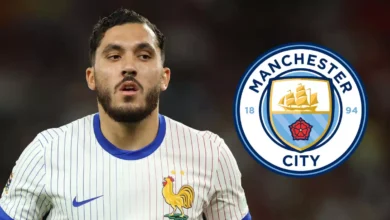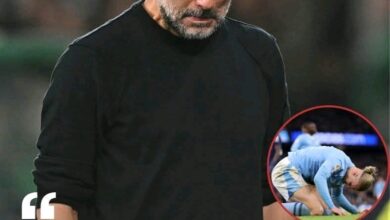Van Dijk’s late header earns Liverpool dramatic win against Atlético Madrid

Liverpool have built a reputation this season of waiting until the dying moments to break their opponents’ hearts. Under Arne Slot, the Reds have been a team of late drama in the Premier League, a side that always seems to leave it until after the 80th minute before scoring the crucial goals that secure victories. Four games, four wins, and every single one of them sealed by goals that came when the clock was edging towards the finish line. The fans had already started to joke that Slot’s Liverpool were not just a team, they were a thriller movie—always making people wait until the end for the big twist.
But Europe was always going to be different. The Champions League is a competition that does not forgive hesitation, a tournament where big names, experienced managers, and ruthless squads are always ready to punish weakness. When Atletico Madrid came to Anfield, many expected Slot’s men to keep to the script of late goals and nerve-wracking drama. Instead, the Reds shocked even their own supporters by flying out of the blocks in a way no one saw coming.
Within six minutes, the scoreboardready read Liverpool 2, Atletico Madrid 0. Andy Robertson, the Scottish warrior whose energy has carried Liverpool through countless big nights, broke the deadlock. Then, moments later, Mohamed Salah, the Egyptian King, doubled the lead with the type of finish that has become his trademark. Anfield roared, people jumped to their feet, and for a brief moment it looked like Liverpool had destroyed Atletico before the Spanish side had even settled into the game.
Two goals in six minutes against Diego Simeone’s side is no small feat. This is a team known across Europe for their defensive toughness, for their tactical discipline, for suffocating opponents and making them suffer. But for six minutes, they looked ordinary. They looked like a team that had been hit by a storm they could not control. Robertson’s goal had come from relentless pressure down the left, a surging move that caught Atletico flat-footed. Salah’s strike, clinical and precise, was like a dagger that left Simeone on the touchline gesturing wildly, trying to wake his players up from a nightmare start.
The Liverpool players celebrated, but there was also a sense of surprise. This was not the script. This was not the Liverpool of the Premier League season so far. Slot’s men were supposed to build slowly, to grind, to suffer until late, and then strike like assassins in the final moments. But here they were, two goals up before the sweat had even started to drip down the players’ faces.
Yet football, especially on European nights, has a cruel way of reminding teams that nothing is ever done too early. If Liverpool thought they had buried Atletico, they were mistaken. Very mistaken. Because from the shadows stepped an unlikely hero for the visitors, a man who seems to come alive at Anfield more than in any other stadium—Marcos Llorente.
Llorente is not the kind of player people usually associate with goals. He is versatile, often used as a full-back, sometimes as a midfielder, always known for his work rate and tactical intelligence rather than for scoring. But against Liverpool, in the Champions League, he transforms into something else. On this night, he scored twice, reminding everyone that Anfield has been his personal stage before. By the end of the evening, he would take his tally of Champions League goals at this iconic stadium to four, a statistic that feels unbelievable for a player not known as a striker.
The first goal came in stoppage time of the first half. Just when Liverpool were cruising and perhaps thinking of the interval, Atletico struck. The ball was worked across, and Llorente, finding himself in space, poked it past Alisson. The Brazilian goalkeeper immediately raised his hands in protest. He shouted at the referee, at the linesman, at anyone who would listen. His frustration was clear—Antoine Griezmann had been standing in an offside position, directly in front of him, obstructing his view. Alisson argued that he could not see the ball clearly, that Griezmann had distracted him, that the goal should never stand. But the officials waved it away, and VAR, after a brief check, allowed it to stand.
Anfield booed. The Kop roared with anger. The players surrounded the referee, their faces filled with disbelief. Slot stood on the touchline, shaking his head. It felt like injustice. And perhaps it was. Former referee Mark Clattenburg would later come out and say that Liverpool had been robbed, that Griezmann’s position had indeed interfered with Alisson. But in the moment, none of that mattered. The scoreboard showed 2-1. Atletico were back in the game.
The timing of the goal was cruel. Scoring just before half-time is always a psychological blow. Instead of walking into the dressing room two goals up and confident, Liverpool were suddenly reminded that this was Atletico Madrid, a team built on resilience, a side that never accepts defeat easily. Simeone, in his black suit, was now prowling the touchline like a predator sensing weakness. His players responded in kind.
The second half became a war. Liverpool pushed for a third to kill the game, but Atletico fought for an equaliser with everything they had. The tackles grew fiercer, the atmosphere tighter, the noise from the stands louder. Every pass was contested, every ball chased.
Then, in the 81st minute, Llorente struck again. This time there was no debate, no offside, no complaints. The ball broke to him in the box, and he finished clinically, sending the away fans into wild celebrations. Liverpool players stood frozen, their two-goal lead gone. From 2-0 up to 2-2, it felt like a disaster unfolding. Anfield fell silent for a moment, the fear of another European collapse hanging in the air.
Simeone’s men celebrated like they had won. They had clawed back from the dead, and with less than ten minutes to go, they looked ready to take a point back to Madrid. But Liverpool, under Slot, have shown something this season—a refusal to die, a refusal to accept anything less than victory. And when you play at Anfield, in front of the Kop, the game is never over until the final whistle.
As the clock ticked into stoppage time, tension gripped the stadium. Fans were biting their nails, standing on their feet, screaming for one last push. And then it came. In the 92nd minute, Virgil van Dijk rose above everyone. The Dutch captain, the leader at the back, turned saviour at the front. From a corner, he powered a header past the goalkeeper, the ball crashing into the net as Anfield erupted. The ground shook, the noise was deafening, and the Liverpool players swarmed towards Van Dijk in celebration.
It was the perfect ending, the kind of ending Liverpool fans have come to expect. Once again, their team had left it late. Once again, they had written a script filled with drama and tension. Once again, they had reminded the world that at Anfield, under the lights, there is always magic.
The final whistle blew. Liverpool 3, Atletico Madrid 2. Three points secured, a perfect start to their Champions League campaign, and another unforgettable European night for the history books.
But beyond the scoreline, this game told so many stories. It showed the new Liverpool under Slot—capable of starting fast, but still with that habit of leaving it late. It showed the resilience of Atletico, a team that refuses to be beaten quietly. It showed the controversial side of VAR, with debates about whether justice had truly been done. And it showed the leadership of Van Dijk, the man who once again stood tall when his team needed him most.
For Slot, it was a test passed. His first European night at Anfield as Liverpool manager had been dramatic, chaotic, and emotional—but it had ended with victory. For Simeone, it was another reminder of how fine the margins are in this competition. And for the fans, it was another night to remember, another story to tell, another chapter in the never-ending romance between Liverpool and the Champions League.
Because in the end, this is Anfield. And at Anfield, drama is never far away















